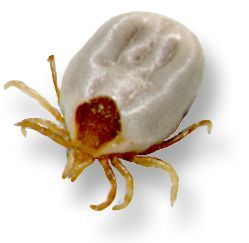Tick season is here early this year so make sure you pooch is protected and give them regular inspections. Daily is best!
Removing a tick

To check for ticks run your fingers slowly over your dog’s entire body. If you feel a bump or swollen area, check to see if a tick has burrowed there. Don’t limit your search to your dog’s torso: check between his toes, under his armpits, the insides of his ears, and around his face and chin.
 To remove an attached tick, use a pair of fine-tipped tweezers or special tick removal instruments. These special devices allow one to remove the tick without squeezing the tick body. This is important as you do not want to crush the tick and force harmful bacteria to leave the tick and enter your pet’s bloodstream.
To remove an attached tick, use a pair of fine-tipped tweezers or special tick removal instruments. These special devices allow one to remove the tick without squeezing the tick body. This is important as you do not want to crush the tick and force harmful bacteria to leave the tick and enter your pet’s bloodstream.
- Grab the tick by the head or mouth parts right where they enter the skin. Do not grasp the tick by the body.
- Without jerking, pull firmly and steadily directly outward. Do not twist the tick as you are pulling.
- Using methods such as applying petroleum jelly, a hot match, or alcohol will NOT cause the tick to ‘back out.’ In fact, these irritants may cause the tick to deposit more disease-carrying saliva in the wound.
- After removing the tick, place it in a bag with a tick killer, you may need to keep it for further identification.
- Clean the bite wound with a disinfectant.
- Wash your hands thoroughly.
Please do not use your uncovered fingers to remove or dispose of the tick. We do not want you in contact with a potentially disease-carrying tick. Do NOT squash the tick with your fingers. The contents of the tick can transmit disease.
Once an embedded tick is manually removed, it is not uncommon for a welt and skin reaction to occur. It may take a week or more for healing to take place. In some cases, the tick bite may permanently scar leaving a hairless area. This skin irritation is due to a reaction to tick saliva.
It is best to always consult your local Vet once a tick has been found. Remember that prevention is always better then a cure. Talk to your local Aussie Pooch Mobile operator for preventative products for your pooch.

